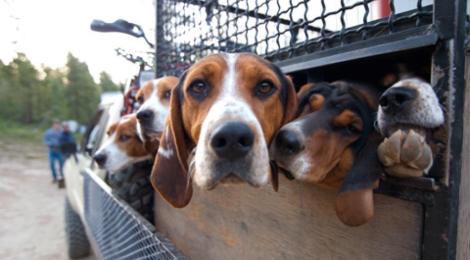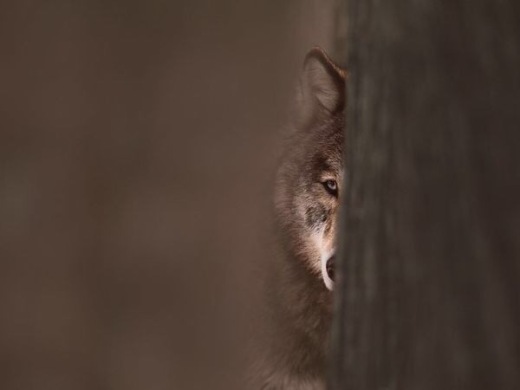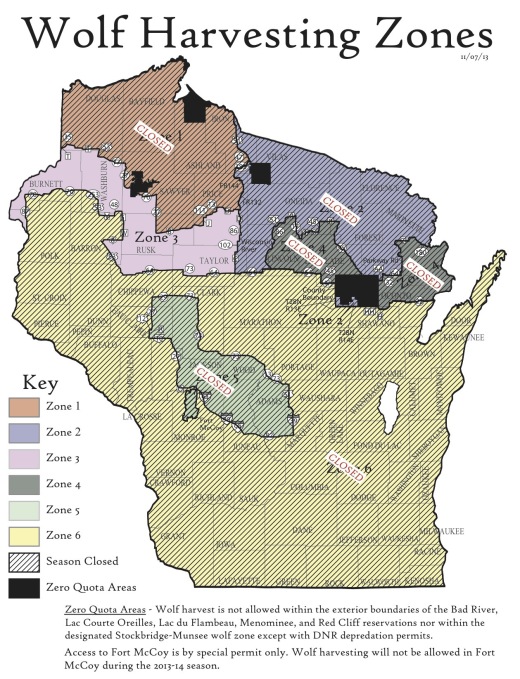
Photograph is of Guest blogger Britt Ricci
Message From Britt:
Greetings, my name is Britt Ricci. I am a Northern Wisconsin native and graduate of geography and environmental studies from the University of Wisconsin-Madison. The subject of predator-human relationships has always been of great interest to me, and involved a significant amount of research during my final year studying in Madison.
Since wolf management responsibilities were turned over to the state of Wisconsin in 2011, an aggressive, multifaceted misinformation campaign has been raging. Our wolves are now facing persecution, supported by false claims and blatant lies of those who want to eradicate wolves as if they were vermin.
I wrote this piece during the first-ever wolf hounding season in 2013 because the mainstream media has done a very poor job in covering the reckless “wolf management” policies that have taken precedence here in Wisconsin. It truly is up to social media and new media to get the story out.
~
Wisconsin Wolf Hounding By Britt Ricci

“The greatness of a nation and its moral progress can be judged by the way its animals are treated.” ~Mahatma Gandhi
According to a survey conducted by the Humane Society, “85 percent of Wisconsin support a ban on using packs of dogs to chase down and hunt wolves.” However, despite overwhelming public outcry, starting December 2, 2013 it became legal for hunters as young as 10 years old to use packs of dogs to hunt wolves. Wisconsin is the only state to authorize the practice, arguably the most controversial and most opposed aspect of the state’s wolf hunting regulations.
Wisconsin wolf hunt territory is divided into six “harvest” zones, each with its own limit. Each zone remains open until the limit is reached or until the season’s end in February, whichever comes first. Three weeks into the 2013 wolf “harvest” season, quotas for all but one zone had already been filled and closed for the year. Zone 3 however, (see map below) was the only zone left open, and had so far reported very few kills. Conservationists suspected that hunting groups in the region had made a concerted effort to hold off until December, when they could legally, for the first time in history, unleash their packs of hunting hounds on Wisconsin wolves.
With this aggressive hunting method, animal behavior experts warn that violent clashes are inevitable. Encounters between wolves and dogs are ferocious and frequently result in the death and dismemberment. Only in the state of Wisconsin are wolf hounders permitted to release dogs fitted with radio collars, giving them free-reign into the forest to run down packs of wolves. When these killer packs meet up with wolves, there will be death and maiming on both sides. Hounders are also allowed to arm dogs with spike collars consisting of nails and shards of steel, intended to lacerate the mouths of wolves as they try to defend themselves and their family members. With canid on canid conflict, it becomes a blood sport — no more than an organized dog fight, which is illegal in the United States. Dr. Joe Bodewes, a veterinarian based out of Minocqua, Wisconsin described the damage to bear hunting dogs in a recent letter to the Wisconsin State Journal:
Broken and crushed legs, sliced-open abdomens and punctured lungs. Dogs lying mangled and dying on the surgery table — all in the pursuit of “sport”.
To minimize depredations, the DNR maintains a website and sends out email alerts regarding areas where wolves, which are highly territorial animals, have killed dogs. However, some hunters with dogs are still not avoiding these areas. For example, the site lists a dozen attacks since 2009 by the Flag River wolf pack within a small area in Bayfield County. But despite the warnings, four dogs were killed there in the year 2013.
Furthermore, bear hunters who choose to put their dogs at extreme risk of horrific injury and even death can be compensated with Wisconsin tax payer dollars. A dog killed by a wolf can earn its owner up to $5,000 in depredation payments, even though hunters knowingly put these dogs in harm’s way. According to the Wisconsin DNR, in the year 2013, 23 bear hunting dogs were killed by wolves and an estimated $140,000 was paid to the owners as compensation. No other state compensates owners for hunting dogs killed by wolves. Many speculate that Wisconsin’s compensation program creates “an incentive for abuse” — that is, some hunters consider their dogs expendable, and are willing to put them in harm’s way, especially if the state will compensate them for any loss.
State Sen. Fred Risser, D-Madison, opposes the use of these funds to compensate the owners of hunting dogs: “I don’t feel that the money the DNR gets should pick up the tab for what is discretionary by hunters.”
Since the wolf depredation program began in 1985, the Wisconsin DNR has paid out $1.6 million in compensation for attacks on livestock and other animals. Nearly a third of this sum has gone to the owners of hunting dogs.
Unfortunately, only a handful of small, politically entrenched and powerful advocacy groups have had everything to do with influencing wolf management policies in Wisconsin. These prominently include the Wisconsin Bear Hunters Association, the Safari Club International and United Sportsmen of Wisconsin. Collectively, these groups spent nearly $400,000 since 2004 lobbying state officials for their support of the wolf hunt. The wolf hunt bill’s lead Assembly sponsor, former state Rep. Scott Suder (R) even attempted to snare the United Sportsmen a $500,000 state grant, which was denied due to legal concerns raised about the group’s eligibility and honesty.
Last year, a majority of the Conservation Congress voted to prohibit the use of dogs in wolf hunting altogether. The passing of Senator Fred Risser’s Senate Bill #93 would accomplish this goal. However, the bill is still languishing in the Senate Natural Resources Committee and has not yet been scheduled for a hearing. In a move to obstruct the democratic process, the case remains stalled at the desk of the committee chairman, preventing the bill to enter the floor for a fair vote. It appears that hunting factions have convinced Wisconsin’s Natural Resources Committee that illegal dog fighting is considered acceptable in Wisconsin.
Wolves of Douglas County Wisconsin, a wolf advocacy group out of northern Wisconsin, has been working with Senator Fred Risser to have dogs removed from the wolf hunt. Right now, the group is focused on exposing the cruelty of this practice in hopes to educate Wisconsinites on this archaic method of killing. “We want Wisconsinites to know what will happen when packs of dogs are unleashed on wolves,” said Rachel Tilseth, founder of WODCW. “There has never been a more important time for the people of Wisconsin to show they are not going to give in to a small group of people that want to torture animals for fun under the guise of “sport.”
The brutality, abuse and torture of wolves and dogs should not be acceptable to the people of Wisconsin. Wolf hunting with dogs is nothing more than state sanctioned animal fighting likely to result in vicious and deadly encounters between these animals. Was the intention to spend decades of money to restore our endangered wolf population only to allow a small percentage of barbaric hunters and trappers take them back to the brink of extinction?

(Photo credit: Jim Brandenburg Photography)
~
Britt Ricci is a lifestyle blogger, landscape photographer and environmental activist. To read more from her awareness column, please visit >> http://www.afterhoursradio.org/category/brittric/
source



No comments:
Post a Comment